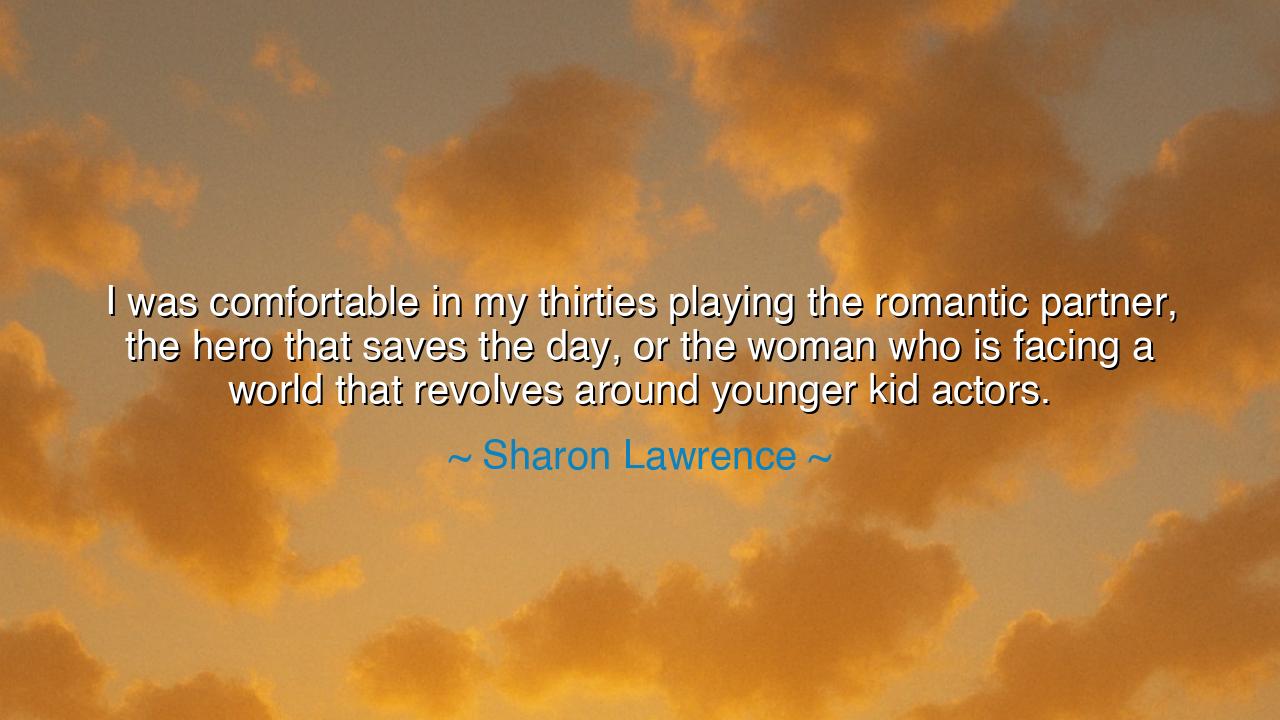
I was comfortable in my thirties playing the romantic partner
I was comfortable in my thirties playing the romantic partner, the hero that saves the day, or the woman who is facing a world that revolves around younger kid actors.






"I was comfortable in my thirties playing the romantic partner, the hero that saves the day, or the woman who is facing a world that revolves around younger kid actors." These words spoken by Sharon Lawrence resonate deeply with the idea of embracing one's place in the ever-evolving tapestry of life, especially in the realm of film and society. In this reflection, Lawrence speaks to the comfort she found in her thirties—an age when many women begin to confront the tensions between their youthful potential and the changing demands of both personal identity and public expectations. In the ancient world, such transitions were often marked by significant rites of passage, where individuals were expected to prove themselves worthy of their roles as leaders, mentors, and heroes. Lawrence’s acceptance of her place—whether as a romantic partner, a heroine, or the wise woman amidst the whirlwind of youthful exuberance—echoes the eternal truth that each stage of life carries its own value and dignity.
In the ancient stories of gods and heroes, we see similar figures who, with age, took on new roles and responsibilities, sometimes as guides, sometimes as protectors, but always as those with wisdom born of experience. Consider Athena, the Greek goddess of wisdom and warfare. Though she was depicted as eternally youthful in form, her role in mythology was that of a mentor and protector, a figure who, through her vast knowledge, guided the young heroes such as Odysseus and Perseus. Athena’s strength lay not in her physical prowess alone, but in her experience, her understanding of the world that allowed her to offer counsel and wisdom at crucial moments. Similarly, Lawrence’s acknowledgment of her role as the hero or mentor in her thirties speaks to the enduring power of those who step forward with both youthful energy and the maturity that comes with experience.
The romantic partner that Lawrence mentions holds its own weight in the continuum of heroic roles. In the ancient epics, many of the heroes were not solitary figures but were defined by their relationships with others—whether as lovers, companions, or protectors. The love story of Hector and Andromache in Homer’s Iliad reveals how the romantic partner is not just a passive figure, but a person whose strength and wisdom shape the course of the hero’s journey. Hector, a warrior bound by duty, finds his strength not only on the battlefield but in his deep love and devotion to his wife, Andromache, who, though not a warrior, influences his choices profoundly. Just as Lawrence embraces the role of the romantic partner or heroine, this ancient tale underscores the importance of relationships in shaping a person’s destiny.
In the world of film and television, however, the constant rise of younger talent often forces seasoned actors to navigate a world that revolves around youth. This is an ancient dilemma, echoed in the myths of gods who, though eternal in nature, often faced the encroachment of younger gods or heroes. In Greek mythology, the Titanomachy—the battle between the Titans and the younger Olympian gods led by Zeus—symbolized the passage from an old world to a new one, where youthful vigor and ambition sought to replace the old order. Similarly, in modern culture, as Lawrence notes, the younger generation often occupies the spotlight, and the older generation must adapt, finding their place not through the exuberance of youth, but through the wisdom that comes with experience.
Consider Odysseus, who, after a long and tumultuous journey, returns home not as a young hero, but as a man who has faced the trials of the world and learned from them. His journey was not just one of physical feats, but one of mental and emotional growth. He became not just a leader in the traditional sense, but a figure who had learned to balance his youthful heroism with the wisdom of age. For Lawrence, the acceptance of playing roles that reflect both romantic and heroic aspects of life in her thirties speaks to a similar wisdom—an understanding that true strength does not always come from physical prowess or youthful beauty, but from the inner growth and resilience that time offers.
The lesson here is this: the transition from one stage of life to another, whether in romantic relationships, career paths, or personal growth, is not to be feared or avoided. Lawrence’s comfort in playing roles of both romantic partner and heroine in her thirties reveals a deep truth: each stage of life carries its own unique power, a power that grows from experience, adaptability, and wisdom. In the ancient world, heroes were not only those who fought battles but those who guided others, mentored the young, and provided wisdom based on years of struggle and growth. Similarly, today, we must learn to embrace our evolving roles with grace, understanding that our value is not dependent on maintaining our youth, but in how we wield the knowledge and insight we gain along the way.
So, to those who come after us: do not fear the changing of the seasons in your life. Just as Lawrence finds comfort in stepping into the roles of both romantic partner and heroine, so too should you embrace the fullness of each chapter in your own journey. Know that the wisdom of experience can be as powerful as the energy of youth. The world does not revolve only around those who are young; it also finds its strength in those who have lived, who have loved, and who have learned from their struggles. And in this, you will find the true heroism that arises from understanding and embracing your place in the ever-turning wheel of life.






AAdministratorAdministrator
Welcome, honored guests. Please leave a comment, we will respond soon